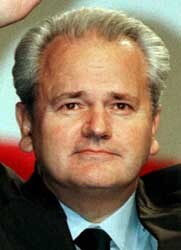
Milošević was born in Požarevac, four months after the Axis invasion of the Kingdom of Yugoslavia to a Serb Orthodox priest who later committed suicide, and was raised during the Axis occupation of World War II. Milošević went on to study law at the University of Belgrade's Law School, where he became the head of the ideology committee of the Yugoslav Communist League's (SKJ) student branch (SSOJ). While at the university, he befriended Ivan Stambolić, whose uncle Petar Stambolić had been a president of Serbian Executive Council (the Communist equivalent of a prime minister). This was to prove a crucial connection for Milošević's career prospects, as Stambolić sponsored his rise through the SKJ hierarchy.
Milošević began his political career as the economic adviser to Belgrade's mayor. He would later marry his childhood friend Mirjana Marković, who later became the leader of Slobodan's junior coalition partner, the Yugoslav Left. Milošević was later able to become the head of Beobanka, one of Yugoslavia's largest banks. A rising star in Yugoslavian politics by 1987, he soon found himself a popular candidate as he declared support for the Serbs in Kosovo who claimed oppression from the ethnic Albanians. Milošević railed against Albanian abuse of power and supported ethnic Serbs first and foremost. Milošević took steps to consolidate power by expelling members of his party who criticized his Kosovo stance. After quietly replacing their supporters with his own, Milošević's ascent to the presidency was assured.
Shortly after taking power, Milošević clamped down hard on civil and constitutional rights. Free media was mostly co-opted by the government, and free speech was restricted enormously. Milošević continued to utilize the Serbian nationalist agenda publicly, while allegations later followed that he had sent aid to 'freedom fighters' in Balkan conflicts. For more information on the conflicts, see The Yugoslav Wars.
In response to the said support for 'freedom fighters', in 1992, UN imposed economic sanctions on Yugoslavia (at this point, consisting only of Serbia and Montenegro) that crippled the country's economy, already severely strained by the conflict. In return, Milošević's government basically allowed the black market to run freely: state-controlled mafia smuggled gas and cigarettes into the country, and the Ministry of Finance secretly organized and publicly supported several Ponzi Schemes, that robbed people of their savings. The crime rate skyrocketed as Serbia and Montenegro faced record hyperinflation, unemployment and influx of guns from nearby battlefields. Several powerful crime groups emerged during this era.
During the Kosovo War, Milošević was indicted for crimes against humanity. Finally, he was defeated in an election by the opposition and was forced to concede power at last. Milošević was later apprehended and forced to stand trial before the Hague, where, as mentioned previously, he died five years into his trial, leaving behind a controversial legacy.
Appears in the following works:
- The Big Bad of the 1992 film The Black Bomber
 is an Affably Evil Expy of Milošević, called Bogdan Marković.
is an Affably Evil Expy of Milošević, called Bogdan Marković.
- The 2021 mini-series The Family
 portrays, with stunning accuracy, Milošević's last three days of "freedom" he spent barricaded in his villa, surrounded by most of his family and his cronies. The new, democratically elected Serbian government wanted badly to arrest him and extradite him, but in order to do so, they had to rely largely on Milošević's men in the police and the military.
portrays, with stunning accuracy, Milošević's last three days of "freedom" he spent barricaded in his villa, surrounded by most of his family and his cronies. The new, democratically elected Serbian government wanted badly to arrest him and extradite him, but in order to do so, they had to rely largely on Milošević's men in the police and the military.
- Appears in Family Guy as one of Peter's guests when he briefly secedes his house from the United States as the nation of Petoria.
